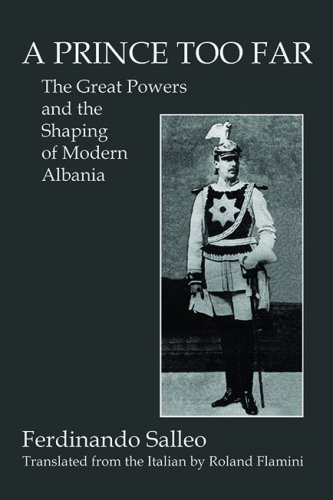
About the Author
Ferdinando Salleo is an Italian career diplomat and former Ambassador to the USSR, then to Russia, and to the United States. He held senior posts in the Italian Ministry of Foreign Affairs, including that of Secretary General. Taught at the University of Florence and was professor at the LUISS University of Rome. He is a member of the Trilateral Commission.
Roland Flamini translated Ambassador Salleo’s book from the original Italian. He writes about foreign affairs in Washington DC. For almost three decades, he was a TIME magazine correspondent and bureau chief in the Middle East and Europe, including many years in Rome. For Random House Inc., he translated Massimo Franco’s Imperi Paralleli, a history of U.S.-Holy See diplomatic relations. He published several other books, including Pope, Premier, President (Macmillan), an account of Vatican’s relations with Eastern Europe and the Soviet Union in the 1960s.
A PRINCE TOO FAR: The Great Powers and the Shaping of Modern Albania
Ferdinando Salleo. Translator from Italian, Roland FlaminiVellum, 2016
152 Pages, 109 photos
ISBN 978-0-9966484-2-4 Paperback
For BULK ORDERS, order directly from New Academia Publishing.
Queries: orders@newacademia.com
About the Author
Ferdinando Salleo is an Italian career diplomat and former Ambassador to the USSR, then to Russia, and to the United States. He held senior posts in the Italian Ministry of Foreign Affairs, including that of Secretary General. Taught at the University of Florence and was professor at the LUISS University of Rome. He is a member of the Trilateral Commission.
Roland Flamini translated Ambassador Salleo’s book from the original Italian. He writes about foreign affairs in Washington DC. For almost three decades, he was a TIME magazine correspondent and bureau chief in the Middle East and Europe, including many years in Rome. For Random House Inc., he translated Massimo Franco’s Imperi Paralleli, a history of U.S.-Holy See diplomatic relations. He published several other books, including Pope, Premier, President (Macmillan), an account of Vatican’s relations with Eastern Europe and the Soviet Union in the 1960s.
About the book
The newly liberated Albanians were not invited to the Great Powers’ conference on the future of Albania in London in August 1913. The conferees established an International Commission of Control to oversee the creation of a new Albanian state, and in its final week drew the frontier between Albania and Greece. A compromise had to be struck between Austro-Hungary and Italy (supporters of Albanian claims) and Russia and France (supporters of Greek claims). It was decided that Albania should become an independent kingdom, and the designated leader was Prince Wilhelm of Wied, a Protestant minor prince related to the queens of Romania and the Netherlands. The Muslim minority in Albania lost no time in rising in rebellion against their new king. Salleo goes into considerable detail about the actual fighting, but he is at his best in describing the political maneuverings of the participating powers as they attempt to second guess each other, and to gain advantage as the larger conflict loomed ever larger.





 Coming Soon
Coming Soon Awards
Awards